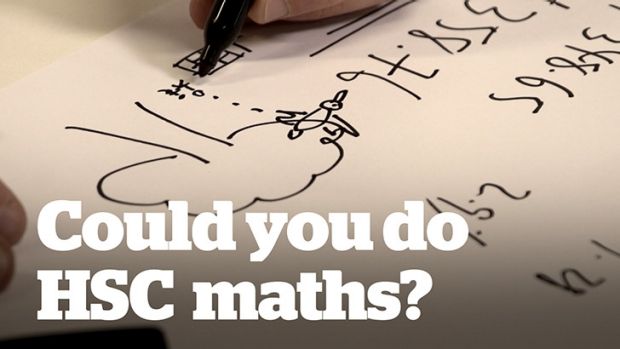The percentage of HSC students studying mathematics has fallen to its lowest level since the state-wide exam was established 50 years ago, while the number of students studying at least one Vocational Educational and Training course is at its highest.
Of the 69,350 students on track to complete their HSC this year, 77.6 per cent are studying at least one maths subject. That is a significant fall from nearly 95 per cent of students who studied maths in 1986, figures from the Board of Studies, Teaching and Educational Standards NSW show.
More News Videos
HSC maths: could you do it?
We test a few grown-ups with a couple of questions from the 2015 HSC General Mathematics paper. Some found it a little more challenging than others.
Maths has consistently been the most popular elective course since the HSC was established in 1967, with total enrolments across the five maths subjects second only to English, which is compulsory.

The fall in the percentage of year 12 students studying maths is matched by similar falls in the relative popularity of other top 10 HSC subjects. Biology, for instance, is being studied by 25.97 per cent of students this year, compared to 38.3 per cent in 1986.
Three languages - French, Latin and German - were in the top 15 most popular subjects in the 1967 HSC. French and German were in the top 15 in 1976, and French was the 14th most studied in 1986. Since then, no languages have been in the top 15.
"English is the universal language of the internet and international trade so there isn't the same imperative to learn other languages now," the BOSTES director of research, Andy Goodyer, said.
Another once-popular course, General Studies, which was in the top five subjects in the 1970s, 80s and 90s, and was studied by as many as 46 per cent of HSC students, was discontinued in 2000. The "peculiar" one unit subject primarily drew on knowledge from other courses, with the final exam consisting of five random essays, Mr Goodyer said.
Other courses have been introduced when BOSTES identified demand. Business Studies, PDHPE, Studies of Religion and Legal Studies, which were all introduced in the early 1990s, are now among the eight most popular subjects.
BOSTES' executive director, curriculum, teaching and assessment Paul Hewitt, said enrolment numbers dropping to about 15 students nationally would place a course under threat. The exception was language courses, some of which were studied by as few as three NSW students, but which were still maintained.
"Community languages are really about supporting the cultural heritage of students," he said. "You wouldn't expect everyone to want to learn Dutch, but it's important for the students who do."
In terms of axing, Mr Hewitt said there were currently no courses "on the board's radar".
A record of 69,350 students enrolled across 140 courses will sit their exams during October and November this year, compared to 8000 students with the choice of 28 subjects who sat the first HSC exams in 1967.
"In 1967, 30 per cent of students continued onto the HSC," Mr Goodyer said. "It was very much focused on traditional university preparation.
"Since then, 80 per cent of our students are going on to sit the HSC, so there's much more diversity."
Meanwhile, 30 per cent are studying at least one VET course, compared to 4 per cent in the early 1990s.
Mr Hewitt said: "With training courses, students develop new skills and can still do traditional courses.
"Hospitality is extremely popular and many students use those skills for getting through university.
"Many will be baristas or work in restaurants, so it's a very smart decision."









